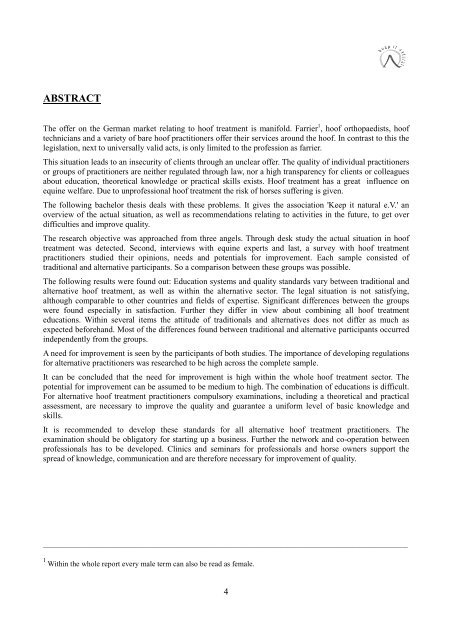Bachelor Thesis - Christina Kuenen - Hufpfleger
Bachelor Thesis - Christina Kuenen - Hufpfleger
Bachelor Thesis - Christina Kuenen - Hufpfleger
Create successful ePaper yourself
Turn your PDF publications into a flip-book with our unique Google optimized e-Paper software.
ABSTRACT<br />
The offer on the German market relating to hoof treatment is manifold. Farrier 1 , hoof orthopaedists, hoof<br />
technicians and a variety of bare hoof practitioners offer their services around the hoof. In contrast to this the<br />
legislation, next to universally valid acts, is only limited to the profession as farrier.<br />
This situation leads to an insecurity of clients through an unclear offer. The quality of individual practitioners<br />
or groups of practitioners are neither regulated through law, nor a high transparency for clients or colleagues<br />
about education, theoretical knowledge or practical skills exists. Hoof treatment has a great influence on<br />
equine welfare. Due to unprofessional hoof treatment the risk of horses suffering is given.<br />
The following bachelor thesis deals with these problems. It gives the association 'Keep it natural e.V.' an<br />
overview of the actual situation, as well as recommendations relating to activities in the future, to get over<br />
difficulties and improve quality.<br />
The research objective was approached from three angels. Through desk study the actual situation in hoof<br />
treatment was detected. Second, interviews with equine experts and last, a survey with hoof treatment<br />
practitioners studied their opinions, needs and potentials for improvement. Each sample consisted of<br />
traditional and alternative participants. So a comparison between these groups was possible.<br />
The following results were found out: Education systems and quality standards vary between traditional and<br />
alternative hoof treatment, as well as within the alternative sector. The legal situation is not satisfying,<br />
although comparable to other countries and fields of expertise. Significant differences between the groups<br />
were found especially in satisfaction. Further they differ in view about combining all hoof treatment<br />
educations. Within several items the attitude of traditionals and alternatives does not differ as much as<br />
expected beforehand. Most of the differences found between traditional and alternative participants occurred<br />
independently from the groups.<br />
A need for improvement is seen by the participants of both studies. The importance of developing regulations<br />
for alternative practitioners was researched to be high across the complete sample.<br />
It can be concluded that the need for improvement is high within the whole hoof treatment sector. The<br />
potential for improvement can be assumed to be medium to high. The combination of educations is difficult.<br />
For alternative hoof treatment practitioners compulsory examinations, including a theoretical and practical<br />
assessment, are necessary to improve the quality and guarantee a uniform level of basic knowledge and<br />
skills.<br />
It is recommended to develop these standards for all alternative hoof treatment practitioners. The<br />
examination should be obligatory for starting up a business. Further the network and co-operation between<br />
professionals has to be developed. Clinics and seminars for professionals and horse owners support the<br />
spread of knowledge, communication and are therefore necessary for improvement of quality.<br />
________________________________________________________________________________________________________________________<br />
1 Within the whole report every male term can also be read as female.<br />
4


